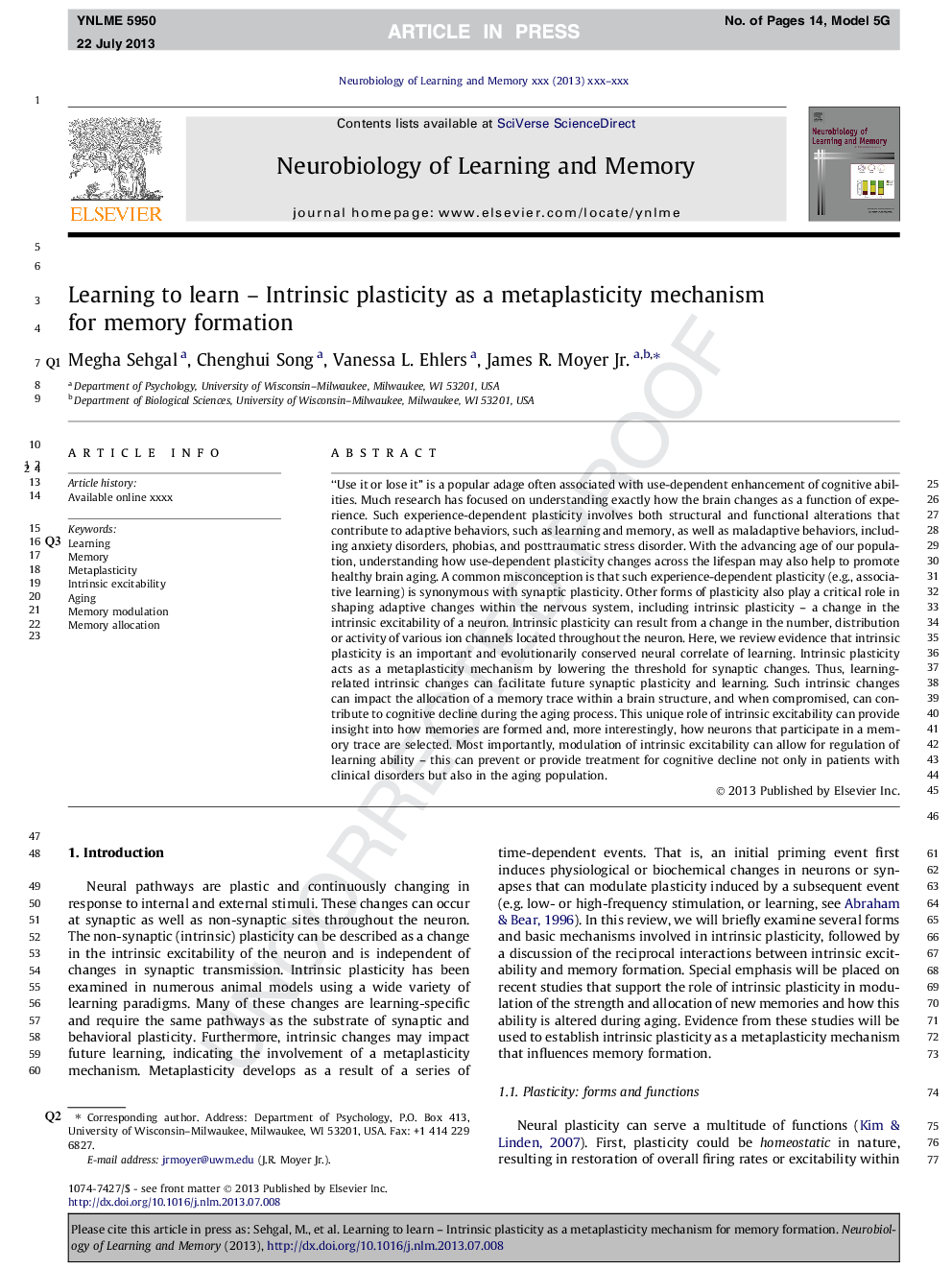| کد مقاله | کد نشریه | سال انتشار | مقاله انگلیسی | نسخه تمام متن |
|---|---|---|---|---|
| 7300525 | 1475170 | 2013 | 14 صفحه PDF | دانلود رایگان |
عنوان انگلیسی مقاله ISI
Learning to learn - Intrinsic plasticity as a metaplasticity mechanism for memory formation
ترجمه فارسی عنوان
یادگیری برای یادگیری - پلاستیکی ذاتی به عنوان مکانیسم متاپلاستیکی برای تشکیل حافظه
دانلود مقاله + سفارش ترجمه
دانلود مقاله ISI انگلیسی
رایگان برای ایرانیان
کلمات کلیدی
یادگیری، حافظه، متاپلستیکی، تحریک پذیری ذاتی، سالخورده، مدولاسیون حافظه، تخصیص حافظه،
ترجمه چکیده
استفاده از آن یا از دست دادن آن؟ اعتراض مردمی است که اغلب با افزایش وابستگی به توانایی های شناختی ارتباط دارد. تحقیقات زیادی بر روی درک دقیق اینکه چگونه مغز به عنوان یک تابع از تجربه تغییر می کند متمرکز شده است. چنین پلاستیکی وابسته به تجربه شامل تغییرات ساختاری و عملکردی است که به رفتارهای سازگار مانند یادگیری و حافظه، و همچنین رفتارهای ناسازگار، از جمله اختلالات اضطرابی، ترس و اضطراب و اختلال استرس پس از سانحه کمک می کند. با افزایش سن جمعیت ما، درک چگونگی پلاستیک وابسته به استفاده در طول عمر تغییر می کند همچنین می تواند به تقویت پیری مغز سالم کمک کند. تصور غلط رایج این است که چنین پلاستیکی وابسته به تجربه (مثلا یادگیری وابسته) مترادف با پلاستیک سیناپسی است. اشکال دیگر پلاستیک نیز نقش مهمی در شکل دادن به تغییرات تطبیقی در سیستم عصبی، از جمله پلاستیک ذاتی - تغییر در تحریک پذیری ذاتی یک نورون. پلاستیسیته ذاتی ممکن است از تغییر در تعداد، توزیع یا فعالیت کانال های مختلف یونی که درون نورون وجود دارد، حاصل شود. در اینجا شواهدی ارائه می دهیم که پلاستیسیته ذاتی یک همبستگی عصبی مهم و تکاملی در یادگیری یادگیری است. پلاستیسیته ذاتی به عنوان مکانیسم متاپلستیک با کاهش آستانه تغییرات سیناپسی عمل می کند. بنابراین، تغییرات ذاتی مربوط به یادگیری می تواند انعطاف پذیری و یادگیری سیناپسی آینده را تسهیل کند. چنین تغییرات ذاتی می تواند تخصیص یک ردیابی حافظه در ساختار مغز را تحت تاثیر قرار دهد و هنگامی که به خطر می افتد، می تواند در کاهش فرآیند پیری موجب کاهش شناختی شود. این نقش منحصر به فرد از تحریک پذیری ذاتی می تواند بینشی در مورد شکل گیری خاطرات ایجاد کند و جالب تر اینکه چگونه نورون هایی که در ردیابی حافظه شرکت می کنند انتخاب شده اند. مهمتر از همه، مدولاسیون تحریک پذیری ذاتی می تواند به تنظیم توانایی یادگیری اجازه دهد - این می تواند درمان یا کاهش زوال شناختی را نه تنها در بیماران مبتلا به اختلالات بالینی بلکه در جمعیت پیری نیز ارائه دهد.
موضوعات مرتبط
علوم زیستی و بیوفناوری
علم عصب شناسی
علوم اعصاب رفتاری
چکیده انگلیسی
“Use it or lose it” is a popular adage often associated with use-dependent enhancement of cognitive abilities. Much research has focused on understanding exactly how the brain changes as a function of experience. Such experience-dependent plasticity involves both structural and functional alterations that contribute to adaptive behaviors, such as learning and memory, as well as maladaptive behaviors, including anxiety disorders, phobias, and posttraumatic stress disorder. With the advancing age of our population, understanding how use-dependent plasticity changes across the lifespan may also help to promote healthy brain aging. A common misconception is that such experience-dependent plasticity (e.g., associative learning) is synonymous with synaptic plasticity. Other forms of plasticity also play a critical role in shaping adaptive changes within the nervous system, including intrinsic plasticity - a change in the intrinsic excitability of a neuron. Intrinsic plasticity can result from a change in the number, distribution or activity of various ion channels located throughout the neuron. Here, we review evidence that intrinsic plasticity is an important and evolutionarily conserved neural correlate of learning. Intrinsic plasticity acts as a metaplasticity mechanism by lowering the threshold for synaptic changes. Thus, learning-related intrinsic changes can facilitate future synaptic plasticity and learning. Such intrinsic changes can impact the allocation of a memory trace within a brain structure, and when compromised, can contribute to cognitive decline during the aging process. This unique role of intrinsic excitability can provide insight into how memories are formed and, more interestingly, how neurons that participate in a memory trace are selected. Most importantly, modulation of intrinsic excitability can allow for regulation of learning ability - this can prevent or provide treatment for cognitive decline not only in patients with clinical disorders but also in the aging population.
ناشر
Database: Elsevier - ScienceDirect (ساینس دایرکت)
Journal: Neurobiology of Learning and Memory - Volume 105, October 2013, Pages 186-199
Journal: Neurobiology of Learning and Memory - Volume 105, October 2013, Pages 186-199
نویسندگان
Megha Sehgal, Chenghui Song, Vanessa L. Ehlers, James R. Jr.,
